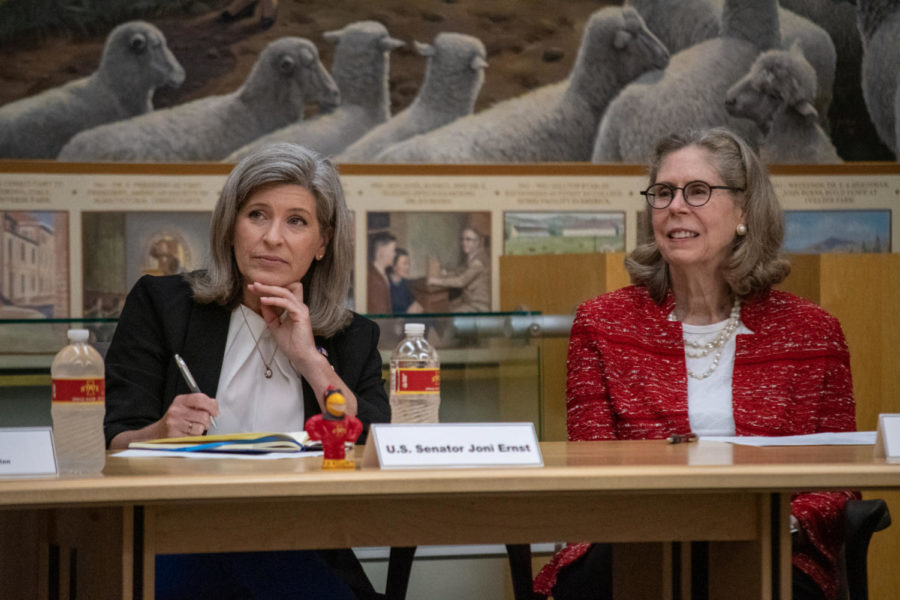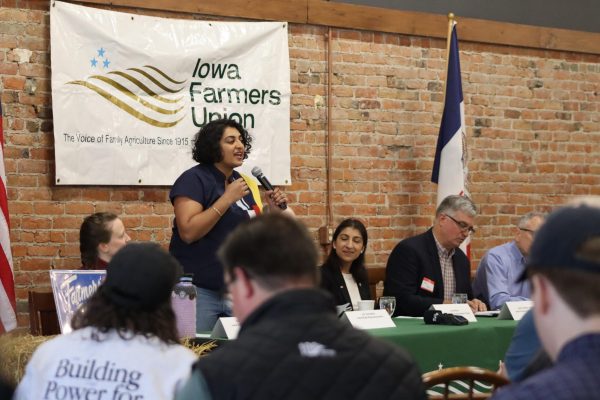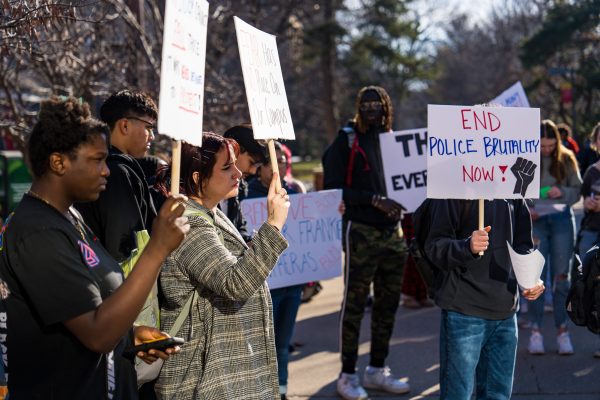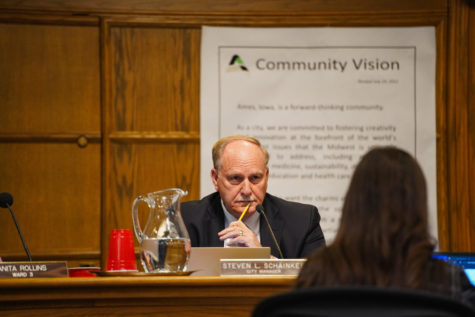Sen. Joni Ernst talks national security with ISU agriculture researchers
Republican U.S. Sen. Joni Ernst joins Iowa State University President Wendy Wintersteen in the Farm Journal Foundation roundtable.
U.S. Sen. Joni Ernst took part in a roundtable conversation with research leaders from Iowa State University to discuss the innovation within the agriculture industry to ensure food security.
The discussion was hosted by the Farm Journal Foundation and Iowa State University administrators such as President Wendy Wintersteen were also in attendance Friday afternoon. Iowa State University researchers presented their progress on initiatives to address food waste and promote sustainable agriculture practices.
Ernst said near-peer competitors are working to find their own research within the agriculture industry.
“We need to continue doing our own research,” Ernst said. “It is imperative that as we’re looking at national security, that the United States of America remains at the forefront of research and development, making sure our own food security is in place because food security is national security.”
African and Middle Eastern nations are facing instability and food insecurity due to the unprecedented war in Ukraine, Ernst said. Associate Teaching Professor of horticulture Dorothy Masinde also co-leads the Service-Learning courses to Uganda where she manages nutrition programs to better the nutritional statuses of women, infants and children.
The program impacted over 60,000 people. Masinde said the program is not just creating food and security, but it is bringing research from Iowa State University to Uganda to improve the capacity building.
“We do see on occasion where those in power are taking that food supply and giving to their supporters or giving to their family members, their associates and so we do need to make sure that it’s getting to the population at large,” Ernst said in reference to food insecurity on the global scale.
About 30% of the food produced in the world doesn’t make it into the consumer’s mouth, said Tom Brumm, a professor of agricultural and biosystem engineering at Iowa State University. Brumm specialized in food loss reduction and said in lower-income countries, food loss happens at the producer level, whereas high-income countries experience most food loss at the consumer level.
Assistant Professor of agronomy Arti Singh, said one way to address food security is by developing greater crop diversity such as plant-based protein crops.
“The market for plant-based protein crops is increasing tremendously, and if you see predictions for 2030 it’s amazing,” Singh said. “So we need to tap that plant base to the market, and we can do that by breeding for these climate resilient drought-tolerant crops.”
One example of this is substituting mung beans for eggs. Singh said there is a company in Minnesota that has produced the equivalent of roughly 300 million eggs from mung beans and there is a market for the product all over the world.
Ernst said it is within the interest of the state of Iowa to expand on crop diversity.
“Especially as we see changes in climate in certain areas and other crops might be worth investing in in the future,” Ernst said. “I think there are other ways our farmers can really tap into new and elevate crops or things that might work better for the climate.”
Larry Sailer, a fourth-generation farmer who joined the roundtable, said the two biggest things he faces on his farm is the weather and markets.
“As you teach farmers to grow things, grow food better, they have to have a market,” Sailer said. “You have to be able to sell it to stay in business. If you can’t market what you grow, you’re out of business.”
Ernst agreed that there has to be profitability for new crops, which should be determined by research. Carolyn Lawrence-Dill is the associate dean for research and discovery at Iowa State’s College of Agriculture and Life Science. She said in order for the United States to lead worldwide initiatives in agriculture there needs to be proper funding for the research.
Ernst said she will use the information from farmers and agricultural researchers when she takes part in discussions regarding the 2023 Farm Bill.
“…When we really start working inearnst on the Farm Bill, that not only are we authorizing the level of funding necessary to support these programs, but then we can go to the appropriators and push to make sure they are actually funding the programs at the level we are asking for,” Ernst said.
Also joining the conversation was Lisa Schulte Moore, a professor in the Department of Natural Resources Ecology and Management. She highlighted the development of circular agricultural systems, which aims at minimizing external inputs by using waste to feedstock another cycle such as livestock. Then the manure from the livestock can be recycled and used as a natural fertilizer for crops.
“I think that’s one thing that we can acknowledge, is we need to find great ways of sustaining agriculture and minimizing our carbon footprint and our impact on our communities,” Ernst said. “So innovation is really important, but at the same time making sure that it’s accessible and affordable to all of our ag community.”
Your donation will support the student journalists of the Iowa State Daily. Your contribution will allow us to purchase equipment, send our student journalists to conferences and off-set their cost of living so they can continue to do best-in-the-nation work at the Iowa State Daily.

















